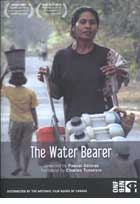
The Water Bearer 2007
Distributed by National Film Board of Canada, 1123 Broadway, Suite 307, New York, NY 10010; 800-542-2164
Producer n/a
Directed by Pascal Gélinas
DVD, color, 52 min.
Sr. High - Adult
Asian Studies, Economics, Globalization, Human Rights, Political Science, South Asian Studies
Date Entered: 09/30/2009
Reviewed by Jane Sloan, Rutgers University LibrariesThe Water Bearer tells the story of Gilles Raymond, a Canadian who decides to help the people of Flores Island, Indonesia to acquire running water in their villages. Such projects, intended to relieve villagers from carrying water for hours each day, are not new on the island. Raymond, who is at the center of the film and is interviewed to complement the narration, believes that these projects must provide an opportunity for the villagers to learn the technology, and sustain it on their own. Other water systems have been built in the past by NGOs, but without regard for maintenance, leading to broken down systems, and unstable progress; Raymond is not a fan of these organizations whom be believes tend to create a “new elite.” Raymond believes that building grassroots autonomy as well as technological knowledge and improvements is the answer to sustained development. He imparts his knowledge of water systems to a village team who help him with the hard labor of laying out miles of water pipe. Once a project is completed, he goes on to the next village, and part of the commitment from the village he has already helped is to bring their new expertise and work with him on the next installation. He insists that the island’s governor work with him to guarantee transparent accounting of funds utilized so there is no possibility of embezzlement. He is, at bottom, a philosopher and political organizer who organizes “from the heart, through solidarity” and who is comfortable haranguing villagers who don’t work hard enough for their future. He has come to the island in his middle age, married, and is raising a family there. All these things make this a story not only about the economics of the developing world, but also about the power and consciousness of a specific individual, and the ways it too can be built on. Towards the end, Raymond reveals himself, admitting he has left a family behind in Canada: “I’m not easy to live with . . . I’m always out busy with people trying to save the world. . . I’m not a hero. People close to me get hurt. . . [for me] the fundamental idea of life is the link between what you think and what you do.” This is a finely shot and edited film with primary visual material focused on the countryside, small villages, and people of this beautiful island in southern Indonesia. Recommended for all libraries, highly for collections focused on political science and South Asia.